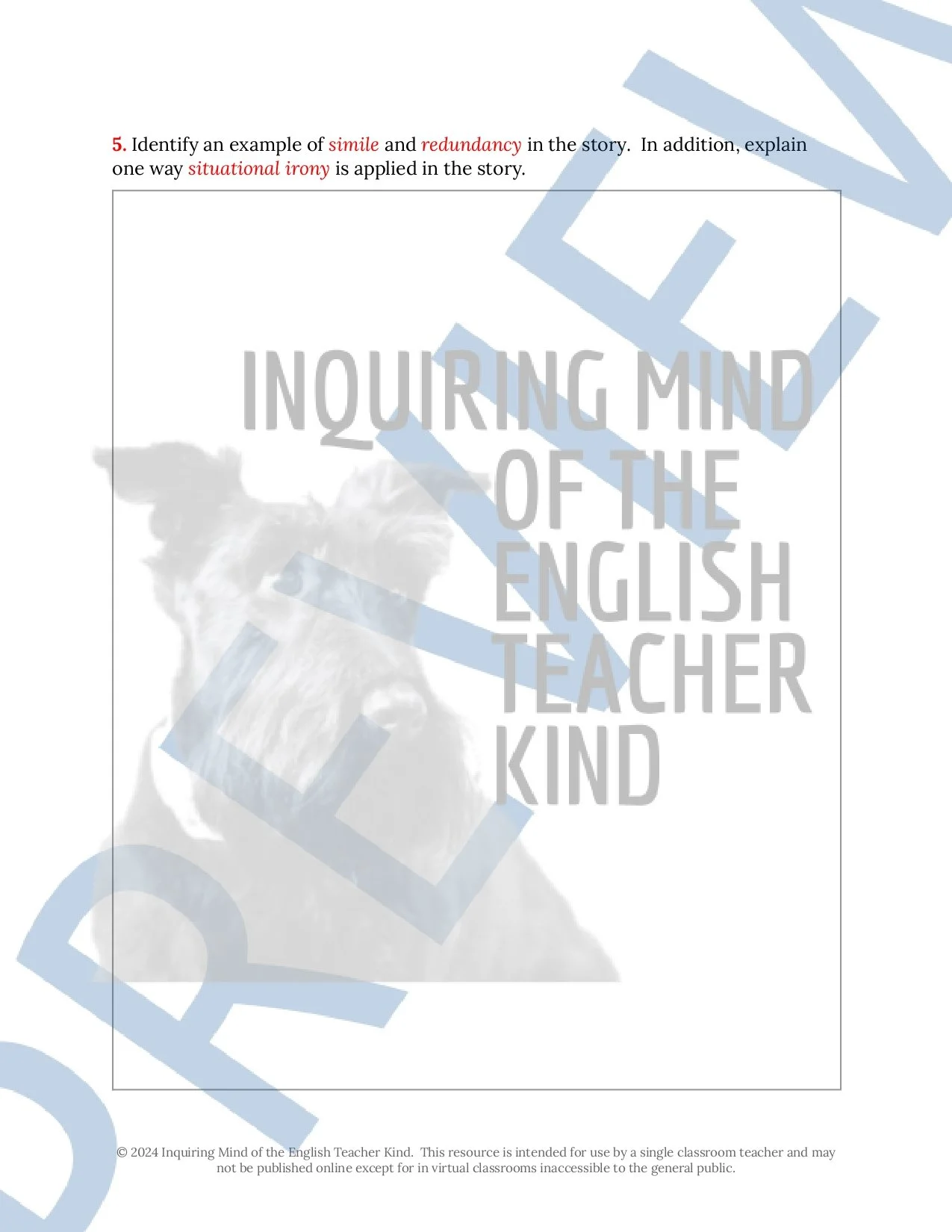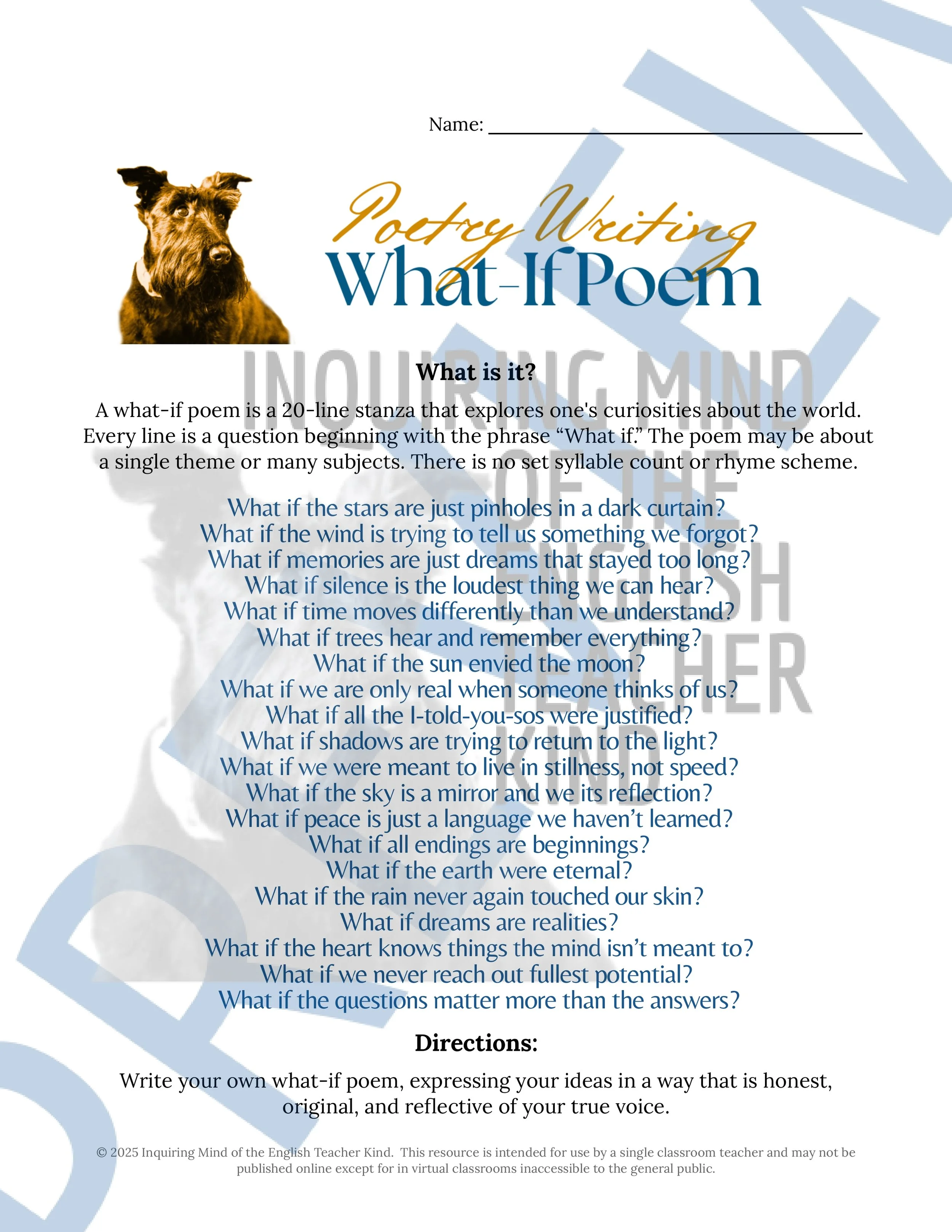 Image 1 of 26
Image 1 of 26

 Image 2 of 26
Image 2 of 26

 Image 3 of 26
Image 3 of 26

 Image 4 of 26
Image 4 of 26

 Image 5 of 26
Image 5 of 26

 Image 6 of 26
Image 6 of 26

 Image 7 of 26
Image 7 of 26

 Image 8 of 26
Image 8 of 26

 Image 9 of 26
Image 9 of 26

 Image 10 of 26
Image 10 of 26

 Image 11 of 26
Image 11 of 26

 Image 12 of 26
Image 12 of 26

 Image 13 of 26
Image 13 of 26

 Image 14 of 26
Image 14 of 26

 Image 15 of 26
Image 15 of 26

 Image 16 of 26
Image 16 of 26

 Image 17 of 26
Image 17 of 26

 Image 18 of 26
Image 18 of 26

 Image 19 of 26
Image 19 of 26

 Image 20 of 26
Image 20 of 26

 Image 21 of 26
Image 21 of 26

 Image 22 of 26
Image 22 of 26

 Image 23 of 26
Image 23 of 26

 Image 24 of 26
Image 24 of 26

 Image 25 of 26
Image 25 of 26

 Image 26 of 26
Image 26 of 26



























High School Creative Writing Unit Plan for Drafting Adventure Fiction Short Stories
Help high school Creative Writing students better understand the conventions of adventure fiction and prepare for the drafting of original short stories with this comprehensive, low-prep, standards-aligned unit plan. Materials are delivered in Word Document and PDF formats. (Alternatively, a Google Drive option is available.) Included are the following:
A detailed, standards-based unit plan articulating the unit's transfer goal(s), essential question(s), enduring understanding(s), learning target(s), academic vocabulary, formative assessment(s), summative performance task(s), and learning plan(s).
Representative adventure fiction narratives by Jack London ("To Build a Fire"), Richard Connell ("The Most Dangerous Game"), and H.P. Lovecraft ("The Beast in the Cave").
Worksheets to facilitate analysis of representative literature.
Detailed directions.
Suggested prompts for students who struggle to generate their own ideas
A comprehensive outline for student planning.
A document to facilitate the editing process.
A comprehensive rubric for evaluating student writing.
With these materials, students will do the following:
Develop greater understanding of the conventions of adventure fiction.
Analyze how famous authors of adventure fiction used characterization, description, and various literary devices that are consistent with the genre.
Organize initial ideas in a coherent manner.
Engage the reader with a compelling exposition that establishes urgency and/or excitement
Use many appropriate narrative techniques (dialogue, dialect, description, pacing, etc.) to enhance plot.
Draft a coherent, cohesive, and appropriate narrative that builds toward a particular tone and outcome (a sense of mystery, suspense, etc.)
Use precise words and phrases, active verbs, and sensory language to convey a compelling story
Draft an unrushed conclusion that resolves conflicts and implies a theme
Show mastery of the conventions of standard English grammar, usage, capitalization, punctuation, and spelling.
Unit plans are available for a variety of writing tasks:
Help high school Creative Writing students better understand the conventions of adventure fiction and prepare for the drafting of original short stories with this comprehensive, low-prep, standards-aligned unit plan. Materials are delivered in Word Document and PDF formats. (Alternatively, a Google Drive option is available.) Included are the following:
A detailed, standards-based unit plan articulating the unit's transfer goal(s), essential question(s), enduring understanding(s), learning target(s), academic vocabulary, formative assessment(s), summative performance task(s), and learning plan(s).
Representative adventure fiction narratives by Jack London ("To Build a Fire"), Richard Connell ("The Most Dangerous Game"), and H.P. Lovecraft ("The Beast in the Cave").
Worksheets to facilitate analysis of representative literature.
Detailed directions.
Suggested prompts for students who struggle to generate their own ideas
A comprehensive outline for student planning.
A document to facilitate the editing process.
A comprehensive rubric for evaluating student writing.
With these materials, students will do the following:
Develop greater understanding of the conventions of adventure fiction.
Analyze how famous authors of adventure fiction used characterization, description, and various literary devices that are consistent with the genre.
Organize initial ideas in a coherent manner.
Engage the reader with a compelling exposition that establishes urgency and/or excitement
Use many appropriate narrative techniques (dialogue, dialect, description, pacing, etc.) to enhance plot.
Draft a coherent, cohesive, and appropriate narrative that builds toward a particular tone and outcome (a sense of mystery, suspense, etc.)
Use precise words and phrases, active verbs, and sensory language to convey a compelling story
Draft an unrushed conclusion that resolves conflicts and implies a theme
Show mastery of the conventions of standard English grammar, usage, capitalization, punctuation, and spelling.
Unit plans are available for a variety of writing tasks:
Preview this resource:
Help high school Creative Writing students better understand the conventions of adventure fiction and prepare for the drafting of original short stories with this comprehensive, low-prep, standards-aligned unit plan.







































